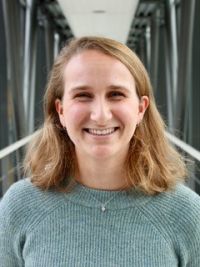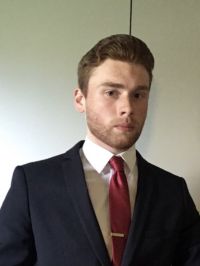Early career researchers
In 25 projects across the country, our PhD candidates and Postdoc researchers are the heroes of BioClock. Animal models, clinical trials, field studies, laboratory protocols; the work of the PhD and Post doc candidates is highly diverse. The trainees have backgrounds ranging from ecology to medicine, from neuroscience to health sciences and many other topics. You can find all BioClock trainees below.
Cluster 1 – Clocks in Society
projects:
Francesca works at the University of Groningen and studies how light affects the biological clock in humans. She will look specifically at the mechanisms of light signals in the brain and the contribution of photoreceptors in the eyes. She includes the effects of light on cognitive performance, among other things.
Kornelija works at the University of Groningen on WP1.1. The aim of this work package is to describe the mechanisms of light effects on behavior and cognitive performance in diurnal and nocturnal mammals and humans.
Ayano works at the Netherlands Institute for Neuroscience and studies the effects of timing of exercise on metabolic disturbances, specifically glucose metabolism. Additionally, she wants to identify brain mechanisms that strengthen the long-lasting beneficial effects of timed exercise.
Gali works at the Leiden University Medical Center and studies the effects of timing of exercise on metabolic disturbances and sleep-wake rhythms., specifically glucose metabolism. Specifically, she will determine if outdoor daylight contributes to the beneficial health effects of exercise training.
Heidi works at the Erasmus MC in Rotterdam. She works in WP1.3 which aims to design biomarker-based personalized prevention strategies to promote sustainable health and performance of shift workers. Specific objectives are to:
- Identify and validate biomarkers to quantitatively assess shift work-related circadian disturbance.
- Determine whether these biomarkers can be used to predict later life health risk.
- Develop evidence-based measures to maintain fitness and employability of shift workers.
More on Heidi’s project is coming soon.
Maaike works at the Erasmus MC in Rotterdam. She works in WP1.3 which aims to design biomarker-based personalized prevention strategies to promote sustainable health and performance of shift workers.
Laura works at the Leiden University and will develop and evaluate interventions that target the biological clock and improve the sleep patterns of university students in order to prevent the development/exacerbation of mental health problems.
Nihal works at the Amsterdam University of Applied Sciences (HvA) and will investigate how the research theme of chronobiology can be integrated in educational programs for high school students. As a teacher and researcher, she will develop and implement this in the program for high school teachers.
Cluster 2 – Clocks in Healthcare
Projects:
Demy works at the Erasmus Medical Center. In her project she aims to improve development and health by strengthening circadian rhythms early in life. Specifically, our objectives are to identify epigenetic health risk markers in preterm infants and establish a circadian rhythm assay as a predictor of later-life circadian performance. Additionally, she wants to elucidate the mechanisms underlying the effectiveness of intervention, by monitoring sleep, neurodevelopment and brain morphology.
Jorine works at the Erasmus Medical Center. In her project she aims to improve development and health by strengthening circadian rhythms early in life. Specifically, she will design a clinical intervention (e.g. maternal rhythm, feeding timing and composition, light conditions) that improves circadian development and postnatal growth and health.
Emma works at the Eindhoven University of Technology on the restoration and optimization of the biological clock of mental healthcare patients with depression. Specifically she will optimize chronotherapeutic interventions to improve well-being and facilitate recovery in depressed patients. Additionally she will identify markers that predict response to antidepressant treatments and enable treatment selection
Georgiana works at the Leiden University. In her project she aims to restore and optimize the biological clock of mental healthcare patients with depression. Specifically she wants to understand the brain mechanisms that make light therapy a successful antidepressant treatment. Also she will identify markers that predict response to antidepressant treatments and enable treatment selection.
Ward works at the Leiden University Medical Center. He wants to establish the role of the circadian clock in the response to cancer immunotherapy.
Koen works at the RIVM and will investigate the timing of vaccinations.
Tamara works at the RIVM and will investigate the timing of vaccinations on the immune response.
Inge works at the LACDR of the Leiden University. In her project she will look for new targets in the biological clock that will adjust the clock. This knowledge can be used to design new drugs and help restore a disrupted biological clock.
Maitreyi aims to improve clock pharmacology by using library screening and developing translational clock assays using cultured brain tissue of murine models. Drug efficacy to boost clock function will thus be assessed at molecular, cellular and network levels.
More about Maitreyi’s project is coming soon.
Cluster 3 – Clocks in the Environment
Projects:
Danielle works at the Institute for Biology in Leiden. She will study the mechanisms by which light pollution affects migrating fish, in order to identify strategies to preserve clock function.
Hannah works at the University of Amsterdam. She contributes to the overall aim of this work package which is to quantify the temporal mismatching effects of light pollution in foodwebs, ranging from plants and herbivores to predators. Hannah works on insects and she will specifically aim to identify how different forms of light pollution lead to temporal (circadian) mismatches between plants, and the activity patterns of herbivores (insects).
Evelien works at the Leiden University. She studies the effects of light pollution on plants.
Sander works at the Netherlands Institute of Ecology Wageningen. He studies the effects of nocturnal light exposure on bats.
Gabriel works at the University of Groningen and NIOO in Wageningen. In his project he investigates many aspects of light and the effects it causes on phototaxis of animal species.
Maaike works at NIOO in Wageningen. The objective of her study is to see how light affects activity of behaviour of amphibians in time and space, and to see whether this effect changes under different intensities and spectral compositions of light.
Associated projects
Several projects closely collaborate with BioClock workpackages. Below you find more information about these projects. More information about these projects is coming soon.
Floor Hiemstra

Floor studies the rhythms of patients at the intensive care unit. Read more on her project here.
Jarne Jermei

Jarne investigates the impact of time-restricted feeding on energy metabolism and brain function. Read more about his project here.
Esther Speksnijder

Esther investigates the role of endocrine rhythms in glucose metabolism and bone health. Read more about her project here.

The BioClock Consortium is funded by the NWA-ORC programme of the Dutch Research Council (NWO; project number 1292.19.077).